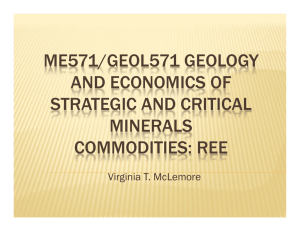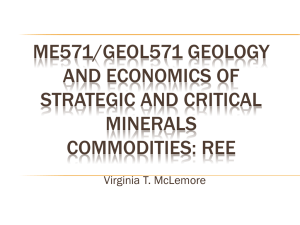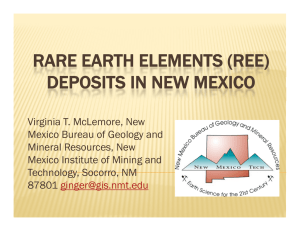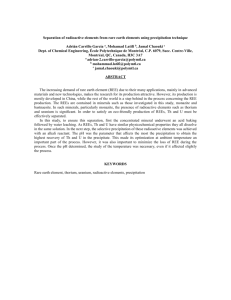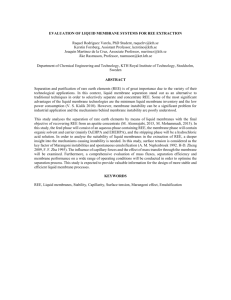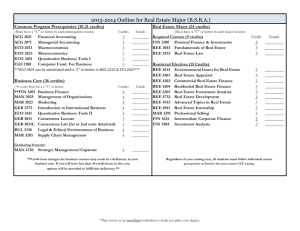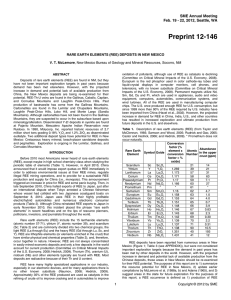RARE EARTH ELEMENTS (REE) DEPOSITS IN NEW MEXICO
advertisement
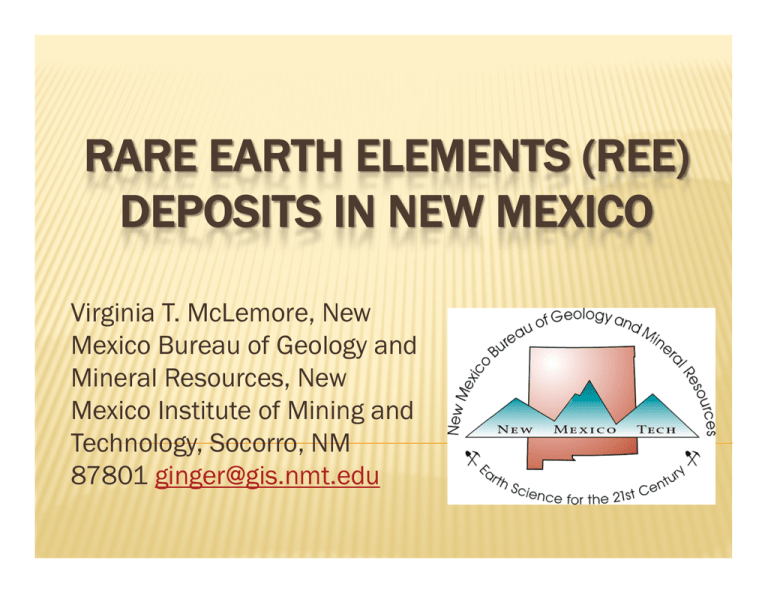
RARE EARTH ELEMENTS (REE) DEPOSITS IN NEW MEXICO Virginia T. McLemore, New Mexico Bureau of Geology and Mineral Resources, New Mexico Institute of Mining and Technology, Socorro, NM 87801 ginger@gis.nmt.edu OUTLINE Introduction ´ Methods ´ Mining and Exploration of REE in New Mexico ´ Types of REE Deposits in New Mexico ´ Potential For New Mexico REE Deposits ´ Challenges ´ Conclusions ´ INTRODUCTION REE ORES •REE ores contain all rare earth elements except Pm •There is no shortage of REE ores Most rare earths are not rare •Most ores are rich in Ce, La, Nd and Pr •The rare earths are chemically very similar •Producers try to balance supply and demand And are rarely successful! RARE EARTH ELEMENTS—USES ´ ´ ´ ´ ´ ´ ´ permanent magnets, 16% automotive catalytic converters, 22% glass polishing and ceramics, 39% petroleum refining catalysts, 12% metallurgical additives and alloys, 9% rare-earth phosphors for lighting, televisions, computer monitors, radar, and x-rayintensifying film, 1% miscellaneous, 1% « « NiMH batteries flints for lighters Toyota Prius 2.2 lbs Nd in magnets 22-33 lbs La in batteries HTTP://WWW.MOLYCORP.COM/HYBRID_EV.ASP USGS OF2011-1189 USGS OF2011-1189 RARE EARTH ELEMENTS—IMPORT SOURCES ´ Bastnaesite (Ce, La, Y)CO3F « China, ´ California Monazite (Ce, La, Th, Nd, Y)PO4 « Australia, 67% « France, 33% ´ Rare-earth metals, compounds, etc. « China, 74% « France, 21% « Japan, 3% « United Kingdom, 1% Mountain Pass, CA Photo from Molycorp, Inc. Bayan Obo mine, near Baotou, China Photo from Google Earth USGS SIR10-5220 MONAZITE HTTP://UN2SG1.UNIGE.CH/ATHENA/... HTTP://MINERAL.GALLERIES.COM/M... APATITE •Bastnaesite CeFCO3 •Apatite > 5400 ppm total REE Ca5(PO4)3(OH,F,Cl) •monazite 500,000 ppm total REE (REE,Th)PO4 •manganese nodules 99,000ppm total REE HTTP://MINERAL.GALLERIES.COM/M... US production Commodity 2009 mt World production 2009 mt consumption 2009 mt Price 2009 World reserves 2009 mt Cu 1,190,000 15,800,000 1,660,000 $2.3/lb 540,000,000 Au 210 2,350 170 $950/oz 47,000 REO 0 124,000 7,410 varies 99,000,000 Be 120 140 140 $120/lb 15900+ Sb 0 187,000 22,400 $2.3/lb 2,100,000 As 385 52,500 3,600 $0.92/lb 1,070,000 Bi 100 7,300 1,020 $7.4/lb 320,000 Ga 0 78 20 $480/kg 1,000,000 Ge 5 14 5 $950/kg 450+ Te W W $145/kg 22,000 cement 71,800,000 2,800,000,000 73,800,000 $100/mton METHODS OF STUDY METHODS Published and unpublished data were inventoried and compiled on existing mines and prospects within NM ´ Evaluated the NURE data ´ Entered data into GIS ´ Field examination ´ Mineralogy and chemical studies ´ MINING AND EXPLORATION HISTORY OF REE IN NEW MEXICO Mining districts and areas in New Mexico that contain REE deposits TYPES OF REE DEPOSITS IN NM TYPES OF REE DEPOSITS IN NM Alkaline Igneous Rocks ´ Carbonatites ´ REE-Th-U Hydrothermal Veins ´ Pegmatites ´ Placer ´ Other REE-Bearing Deposits ´ ALKALINE IGNEOUS ROCKS Igneous rocks with Na2O+K2O>0.3718(SiO2)14.5 ´ Igneous rocks with mol Na2O+mol K2O>mol Al2O3 ´ Capitan pluton Gallinas Mountains PAJARITO MOUNTAIN, MESCALERO APACHE INDIAN RESERVATION NEAR RUIDOSO In 1990, Molycorp, Inc. reported historic resources of 2.7 million short tons grading 0.18% Y2O3 and 1.2% ZrO2 as disseminated eudialyte 3000 Sample/C1 Chondrite ´ 1000 100 70 La Pr Eu Ho Tm Lu Ce Nd Sm Gd Dy Er Yb PROTEROZOIC TO CAMBRIANORDOVICIAN SYENITES, ALKALI GRANITES, EPISYENITES Episyenites in Longbottom Canyon, Caballo Mountains CARBONATITES ´ carbonate-rich rocks containing more than 50% magmatic carbonate minerals, less than 20% SiO2, are of apparent magmatic derivation Chuadera carbonatites (van Allen et al., 1986) Lemitar carbonatites (McLemore, 1983) Lemitar carbonatite REE-TH-U HYDROTHERMAL VEINS various Th and REE minerals found in hydrothermal veins and are commonly associated with alkaline igneous rocks and carbonatites ´ tabular bodies, narrow lenses, and breccia zones along faults, fractures and shear zones ´ North American Cordilleran Belt of Alkaline Igneous Rocks GALLINAS MOUNTAINS, LINCOLN COUNTY Mines and prospects in the Gallinas Mountains, Lincoln County REE-F veins (131 samples) Cu-REE-F veins (65 samples) Breccia pipe deposits (58 samples) Iron skarns (6 samples) SCHEMATIC MODEL OF FORMATION OF THE MINERAL DEPOSITS IN THE GALLINAS MOUNTAINS, LINCOLN COUNTY, NEW MEXICO (MODIFIED IN PART FROM SCHREINER 1993; RICHARDS, 1995; WILLIAMS-JONES ET AL., 2000). PEGMATITES coarse-grained igneous rocks, lenses, or veins with granitic composition, contains essential quartz and feldspar, and represent the last and most hydrous phase of crystallizing magmas PETACA PEGMATITES BURRO MOUNTAINS PETACA PLACERS ´ ´ accumulations of heavy, resistant minerals (i.e. high specific gravity) that form on upper regions of beaches or in long-shore bars in a marginalmarine environment In NM these are Cretaceous in age Sanostee deposit, San Juan County SANOSTEE DEPOSITS FORM ALONG BEACHES REE CHEMISTRY OTHER REE-BEARING DEPOSITS ´ Uranium, thorium, and phosphate deposits and REE could be recovered as a by-product. « Examine sandstone U deposits for REE contents Other placer deposits (fluvial, alluvial placers) could carry anomalous amounts of REE. ´ Fluorite veins can carry high concentrations of REE, especially Y. ´ POTENTIAL FOR NEW MEXICO REE DEPOSITS Pajarito Mountain ´ Carbonatites ´ REE-Th-U hydrothermal vein and breccia deposits ´ « Gallinas Mountains « Episyenites in Caballo, Burro Mts, Lobo Hill CHALLENGES The main challenge is provide society with its needs, protect future resources, limit alteration of the landscape, and affect local communities as little as possible (i.e. sustainable development). KEY ISSUES FOR REE ´ ´ ´ ´ ´ ´ ´ ´ ´ ´ ´ Finite resources Chinese market dominance Long lead times for mine development Resource nationalism/country risk High project development cost Relentless demand for high tech consumer products Ongoing material use research Low substitutability Environmental issues Low recycling rates Lack of intellectual knowledge and operational expertise in the west ADDITIONAL CHALLENGES How much REE do we need? ´ Are there enough REE in the pipeline to meet the demand for these technologies and other uses? ´ Can REE be recycled? ´ Are there substitutions that can be used? ´ What are the reclamation challenges? ´ « REE are nearly always associated with U and Th and the wastes from mining REE will have to accommodate radioactivity and radon BOTTLENECKS ´ Risk and timing of investment « « « ´ Extraction « « ´ Unpredictable Rapid change in demand Engineering/design/production of these products is faster then the exploration/mining/processing Supplies Economically feasible in a timely manner Refining « « Technically feasible Economical CONCLUSIONS REE are important for green technologies as well as our entire lifestyle and new uses will be found because of their unique properties ´ REE are found in specific locations based on favorable geology and there is sufficient supply for the near future ´ Some of the REE required for these green technologies are found in New Mexico ´ Need for understanding the mineralogy and distribution of these minerals in known ore deposits ´


